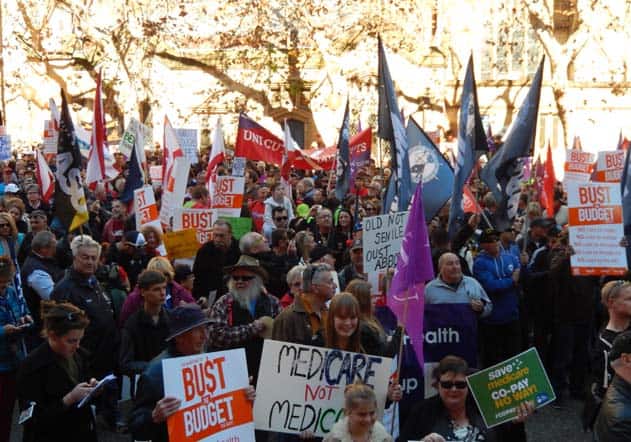The fight to “bust the budget” took a step forward on 6 July, with the first day of action called by the unions. Up to 20,000 marched around the country.
The opening of the new Senate has shown the difficulties Tony Abbott faces. By now most budgets are well and truly bedded down. But Abbott has barely succeeded in getting any of the more unpopular measures in his budget through.
Clive Palmer even managed to turn the vote on scrapping the carbon tax into a nightmare for Abbott. It took the government almost the whole two week sitting of the Senate to get the bill through, as it dealt with all the amendments and changes Palmer demanded.
The government has had one major win on its budget—courtesy of Labor and The Greens. Both parties agreed to wave through the major Appropriations Bills. They passed the Senate on 30 June.
Clive Palmer and Andrew Wilkie were the only lower house MPs to vote against them. These bills contained the cuts to the ABC and SBS, the CSIRO, Aboriginal health and legal services, the sacking of 16,500 public servants and the cut to the pension indexation rate.
Greens leader Christine Milne justified the failure to block supply by saying this would “cause whole of government shutdown” through ending the government’s ability to pay public servants. This would halt the delivery of some government services. But strikes halt the delivery of services too. This does not make it unpopular.
Many of the government’s other hated changes require their own separate legislation, which can still be blocked.
A number of them look finished, like the $7 GP co-payment. But it’s crucial the Senate is not left to its own devices in deciding what to support. Palmer was willing to waive Abbott’s financial advice changes through the Senate, in a win for the big banks. He has also been inconsistent on opposition to university fees. Just months ago he thought a GP co-payment was worth considering.
The government is already looking to make compromises to get its budget attacks through. It hopes to enlist the doctors’ peak body the AMA to support a modified version of the GP co-payment, with Abbott inviting the head of the AMA to a private discussion on the plan. The AMA has said it is not against a co-payment in principle, with many GPs already charging their own fees, but has concerns about the implications for pensioners and the unemployed.
Treasurer Joe Hockey has also said the government would look for other ways to make cuts if the Senate keep blocking budget changes. We need an ongoing campaign against the budget to fight any cuts the Senate can’t block and reject any compromises on issues like Medicare, university fees and cutting welfare.
Step up the campaign
So far the union campaign has not measured up to the level of anger at the budget. During the Your Rights at Work campaign against the Howard government, there were mass stopwork rallies tens of thousands strong—200,000 attended the largest rally in Melbourne.
The stopwork rally held in Melbourne on 12 June has been the largest demonstration against the budget to date with 20,000 people.
In an encouraging sign, the ACTU has now set a date for delegates meetings across the country on 18 September and a day of action on Thursday 23 October. We need to push for the day of action to involve serious stopwork rallies. Union activists in Melbourne and Sydney have organised open letters to Victorian Trades Hall and Unions NSW to push for strike action. We also need motions moved in union and workplace meetings.
There also needs to be a serious union mobilisation for the 31 August rallies organised by March Australia. Both March in March and March in May drew tens of thousands across the country—but on both occasions the majority of unions did nothing to promote them or get members along. August 31 can’t be another missed opportunity.
Large angry student rallies against fee increases on the NUS 20 Augustday of action can help keep the anti-budget momentum going and encourage the unions to call more action themselves.
The senior union officials aren’t willing to lead a campaign to actually stop Abbott’s budget before it is implemented. Whatever cuts Abbott gets away with, whether to jobs in the public sector or hospitals and schools funding, will cause immense damage over the next three years. But most union leaders are simply focused on campaigning to vote Abbott out in two and a half year’s time.
At the delegates meeting held in Sydney in June, Unions NSW shut down a debate about industrial action. But it was clear there was significant support for it. Union activists need to prepare to make the most of the September delegates meetings to strengthen the push for strike action, and demand the kind of fightback that could bury Abbott.






